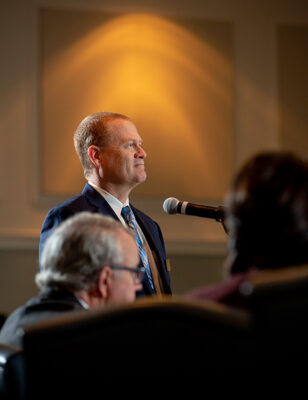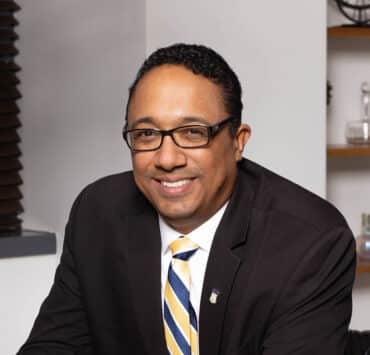|
Getting your Trinity Audio player ready...
|
Originally trained as a chemist at North Carolina State University, Mark Morgan never spent a day in a chemistry lab after earning his degree. Instead, he went to work in the engineering department of a textile firm in South Carolina. After nine years of working on projects, controls, and automation, he yearned to live closer to home, which for him is Wilmington, North Carolina. “I wanted to be closer to family,” Morgan says.
He moved back to Wilmington and opened a construction company, but he realized it was the wrong “season of his life” for such an endeavor. He closed shop and took a job at the University of North Carolina Wilmington (UNCW) as a project manager. “I enjoyed what I did, and it gave me a lot of insight,” Morgan says about owning his own firm. “But I’m better off as the owner’s rep versus the construction company owner.”

Twenty-one years later, he’s still at UNCW but has risen to associate vice chancellor for business affairs–facilities. He and his staff are responsible for the day-to-day operations of the physical plant, repair and renovations through project management, capital construction through architectural and construction services, and fiscal oversight via facilities. He has seven direct reports and 235 staff spread across four groups.
To complete its capital projects, UNCW hires a variety of contractors, but always meets and often exceeds, North Carolina’s requirement of increasing participation of historically underutilized businesses in contractual relationships. And Morgan, who is committed to improving diversity, equity, and inclusion, has been instrumental in UNCW’s DEI efforts.
Contractually, UNCW’s large capital projects require that businesses working with Morgan’s staff perform outreach sessions to identify subcontractors with “minority status” to encourage bidding and participation. “That’s one of the key pieces. General contractors must submit proposed plans and talk through what their initiatives would be to increase participation. It’s very successful,” Morgan says.
But not every construction firm has the resources to tackle a half million-dollar project. Morgan encourages contractors to divide jobs up into smaller components, which allows more subcontracting firms to bid and opens opportunities for BIPOC-owned firms to win contracts.
To address DEI internally, UNCW strives to develop a more diverse workforce at the professional level through its summer internship program, which invites underrepresented students from historically black colleges and universities (HBCUs) to intern at UNCW. In the summer of 2022, the program’s inaugural year, Morgan welcomed two mechanical engineers from the UNC system, one mechanical engineer from Maryland, and a finance student also from the UNC system.
“Most people come to construction understanding the construction side of things, but they have less intuition about how the money flows and what it takes to spend it.”
Mark Morgan
UNCW has no shortage of upper-level engineering jobs, but they require significant experience. “The problem is we don’t get a lot of ‘minority’ applicants with experience, because other firms have already scoped them out,” Morgan says. To attract applicants who have engineering degrees but limited experience, Morgan is creating positions that require less experience. “I think we can increase our ‘minority’ participation in the professional fields doing this,” he explains.
Currently Morgan and UNCW are in the middle of a $62 million capital project to renovate and expand UNCW’s 165,000 square-foot library to 245,000 square feet. Morgan is confident that the library will be online in time for the 2024 fall semester and the project will come in on budget.
“Contractors must submit proposed plans and talk through what their initiatives would be. It’s very successful.”
Mark Morgan
The biggest challenge Morgan faces on the library expansion project is limiting the disruption of the service to students and faculty. “Where do you move a 165,000 square-foot library while it’s being renovated and expanded?” he asks. The solution is to construct the expansion separate from the existing building and add a connector in the last phase of the project. “This way we will not be interfering with the activities in the existing library,” Morgan says.
An added bonus to this plan is the operational flexibility it offers library staff once the addition opens. “If they need to shut down part of the library, for example during low usage in the summer, they won’t necessarily have to open up the entire 245,000 square feet and may not have to staff the entire building,” he says.

Morgan is no stranger to large construction projects with hefty price tags. Since becoming associate vice chancellor for business affairs, Morgan has managed several significant capital projects. He’s built four multistory dorms totaling 500,000 square feet at a cost of $147 million; a 22,000 square-foot dining hall for $14 million; and a Health and Applied Human Sciences building with a footprint of 145,000 square feet costing $66 million. “In the last seven years, we’ve completed about $620 million worth of projects,” he says.
As a leader, Morgan thrives on collaboration. “I’ve never been able to do it on my own. You have to rely on and listen to the staff you have,” Morgan says. He advises those running a plant and its construction projects to understand finances and how money flows through projects. “Most people come to construction understanding the construction side of things, but they have less intuition about how the money flows and what it takes to spend it appropriately,” Morgan says.
Leeper Construction: “Mark has been a catalyst in shaping a collaborative environment. He leads from a place of empowering his associates to manage in an open and receptive manner. He has been proactive in helping our firm meet and greet key stakeholders in the Wilmington area, and actively helping us become part of the Wilmington culture. Thank you, Mark” –Gary Morgan, SVP of Preconstruction & Operations


